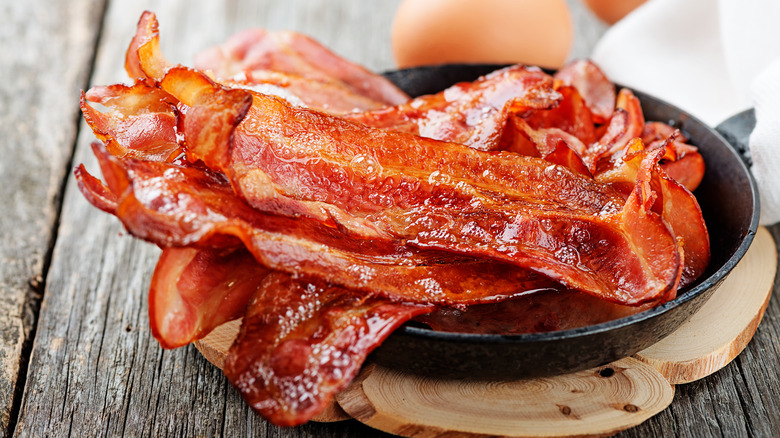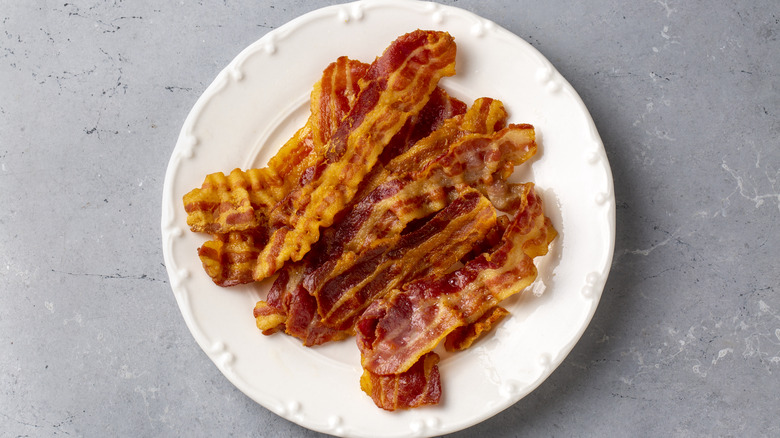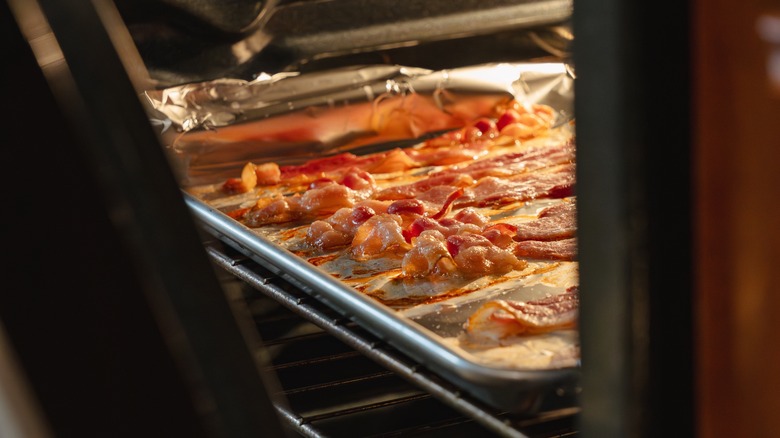How To Store Cooked Bacon In The Freezer
Cooked bacon can be surprisingly difficult to store for later use. Its high fat content makes it prone to developing sour flavors when stored incorrectly, and the presence of surface moisture will quickly ruin its crispy exterior. Using all of your strips before they go bad can also be a challenge, as the U.S. Department of Agriculture recommends that all leftover cooked bacon be consumed within five days, to prevent foodborne illness. Luckily, the average home cook can freeze this delectable food item for later use, and all you need are some paper towels and a sealable plastic bag.
To stash away cooked bacon in the freezer, just layer a paper towel between each layer of cooked strips. This will prevent the strips from clumping as they freeze, giving you a lot more control over how much pork you reheat for later use. You won't be forced to take out more bacon than you can eat at once because the pieces are all stuck together.
From there, layer your bacon and paper towels into a zip-top plastic bag, squeeze out the air, and place it into cold storage. If you don't want to use up paper towels, you can also line a baking sheet with a wax paper to freeze each piece individually, then place them all together into a bag. This step also effectively prevents sticking.
Try to use frozen bacon within a month
The USDA states that cooked bacon will last indefinitely in the freezer without spoiling. This is likely due to the frigid temperatures of cold storage, which are so low that they completely stops all foodborne pathogens from reproducing. However, this doesn't stop your food from slowly losing its quality over time. In the case of bacon, the USDA recommends eating frozen leftovers within a month, so that the pork's flavor and texture are still tasty once reheated. You can remind yourself of this time frame by labeling the bag of bacon with the date of freezing.
Long-term cold storage also with another potential issue: freezer burn. This phenomenon happens when frigid air comes in direct contact with the moisture of food, and causes this moisture to evaporate, leaving behind hollow areas and ice crystals. You can still consume foods affected by freezer burn, but they'll likely be dried out and discolored with an "off" taste. This is why you need to flatten the bag as much as possible to get rid of excess air. If you're worried about your pork strips turning out too brittle in the freezer, try to pick a thicker cut the next time you're at the grocery store.
Tips for reheating cooked bacon that has been frozen
Once you're ready to use your frozen cooked bacon, don't waste time trying to defrost it. You actually don't have to thaw most meats before reheating them, from a safety standpoint, though thick slabs of steak might benefit from some time to warm up. Larger hunks of meat can take longer to cook evenly when frozen. This isn't really a problem with bacon, though, as the strips are so thin that they heat up quickly and evenly.
If you do choose to defrost your cooked bacon, the microwave will be the fastest way to accomplish this. This method only takes a few minutes at most, but you'll have to keep an eye on the meat as it warms up, in order to prevent it from overcooking. From there, you can cook it however you wish. For a slower but gentler alternative, you can also use the oven to reheat bacon and fully cook it, without drying it out. You can warm up an entire bag of leftover strips in one go, and the hot air will ensure that their texture remains crispy.



